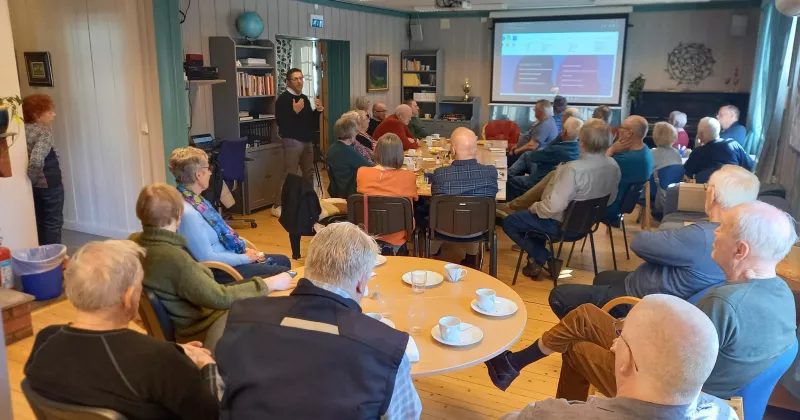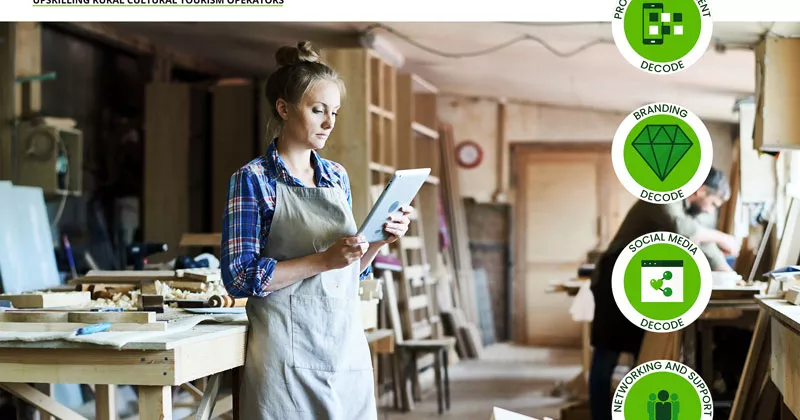Maria Martínez: Learning features for the future of prison education

Short bio
I am a member of AIFED, the Asocación de Innovación, Formación y Empleo para el desarrollo Sostenible, which is a partner organisation in the European project Supporting distance Training and Education in Prison 2020-1-IT01-KA226-VET-009046. At the final meeting of the project in Elba we asked ourselves: What will be the future of prison training? Can we imagine a common Classroom in the Metaverse of all EU prisons?
My story
The development of new technologies, the evolution of the processes of digitalisation and digital globalisation which reduce the distances and cleavages among people through the tools of the virtual world, are social and global phenomena which characterise the current age that we live in. A new virtual world has been created, parallel to the so called "real life" characterised by new ways of communication, information, the creation of socio-economic relations, and last but not least, learning and formation.
Particularly in this final field, it is necessary to learn how to best use the innovations of the technological progress, to adapt to them in order to obtain concrete results through the development of new educative methods, both complementary, to also be accompanied with the traditional methods, or substitutive of the latter, to improve the performance and creation of desirable effects in the field of formation.
Going deeper on this topic and applying it to the formation of adult prisoners and their need to re-insert and re-integrate in society, the futuristic but already real virtual world, represented by the metaverse, is one of the most innovative tools of the new millennium.
The future scenarios of this alternative world are still ongoing and offer a set of new instruments and considerations that are still unexplored and therefore not yet predictable. Despite this, the pre-conditions on the impact that it can have in regard to the considered target group are, at first glance, very promising.
In an attempt to anticipate some of the progresses which could be made in the coming years regarding the considered field of analysis, it can be realistically imagined that the formation of adult prisoners will take place in the metaverse: there will be specific virtual classrooms where they will connect and be represented by their own avatar. Those last will physically (but virtually) attend the formation courses, while the prisoners will be able to find themselves elsewhere, thanks to the facial connecting device to the metaverse. In this way, a mixed learning framework between distance learning and presence learning will be created (considering that the avatar will be present in the virtual classroom and the real person will be elsewhere). This is a hybrid model made possible by this extraordinary and still virgin technology.
The prisoners will benefit from new sets of tools aimed at learning support, which will be created live and directly by the trainer in the virtual classroom (slides, materials, 3D models) and they will also learn to create their own tools, if provided for by the learning needs of the formation course.
They will even learn how to connect to the platform, how to communicate, raise their hand, write, read and move in the virtual classroom, which will be the learning location both at a theoretical and practical level. Producing the needed material for the formation course and the learning needs directly in the metaverse will result in an eco-friendly and green way of working, thus benefiting the environment. The prisoners will learn how to personalise their own avatar, adapting it to their physical traits and distinctive characteristics.
The metaverse can be an even more representative and adherent extension of the external reality and an inclusive, pluralist and tolerant context, where people can freely keep expressing themselves.
Last but not least, learning to use the metaverse, part of a set of new technologies that are being developed or will be developed in the future, will be a learning opportunity itself. Furthermore, it will permit to a social group normally excluded by society to adapt to the digitalisation process (the digital transition) and to a constantly changing world.
Three skills for the future of adult learning?

Kommentarer
Izgalmas lehetőség…
Izgalmas lehetőség mentálisan az Avatar használata, hiszen így egy félig-meddig új identitást is építhetnek a fogvatartottak maguknak, segítve ezzel a rehabilitációjukat.
Bardzo ciekawa perspektywa!
Bardzo inspirujący głos! Do tej pory nie myślałam o meta jako podejściu możliwym do wykorzystania w edukacji penitancjarnej, a przecież to takie oczywiste! Ciekawe, czy wizjonerzy takiego podejścia biorą pod uwagę klasy "mieszane", z członkami i członkiniami innych grup społecznych ? Czy możliwa jest wirtualna klasa, w której uczy się osadzony ze studentem uniwersystetu? Czy to nie byłby kolejny stopień inkluzywnego podejścia do środowiska uczenia się? Dziękuję za tą inspirującą historię!






Bardzo działa na wyobraźnię,…
Bardzo działa na wyobraźnię, choć nie będę ukrywał, że trudno sobie to w tej chwili wyobrazić, jako narzędzie i podejście działające w polskim kontekście. Taka innowacja, to nie tylko technologia, nowe narzędzie, ale cała filozofia i uniwersum postrzegania człowieka. Czy polskie więziennictwo, polskie społeczeństwo, jest gotowe na to by dostrzec w osadzonym człowieka? By zrozumieć, że edukacja jest kluczem do tzw. "resocjalizacji", i że nie jesteśmy już dawno w XUIX wieku? Trzymam kciuki by to się kiedyś wydarzyło.